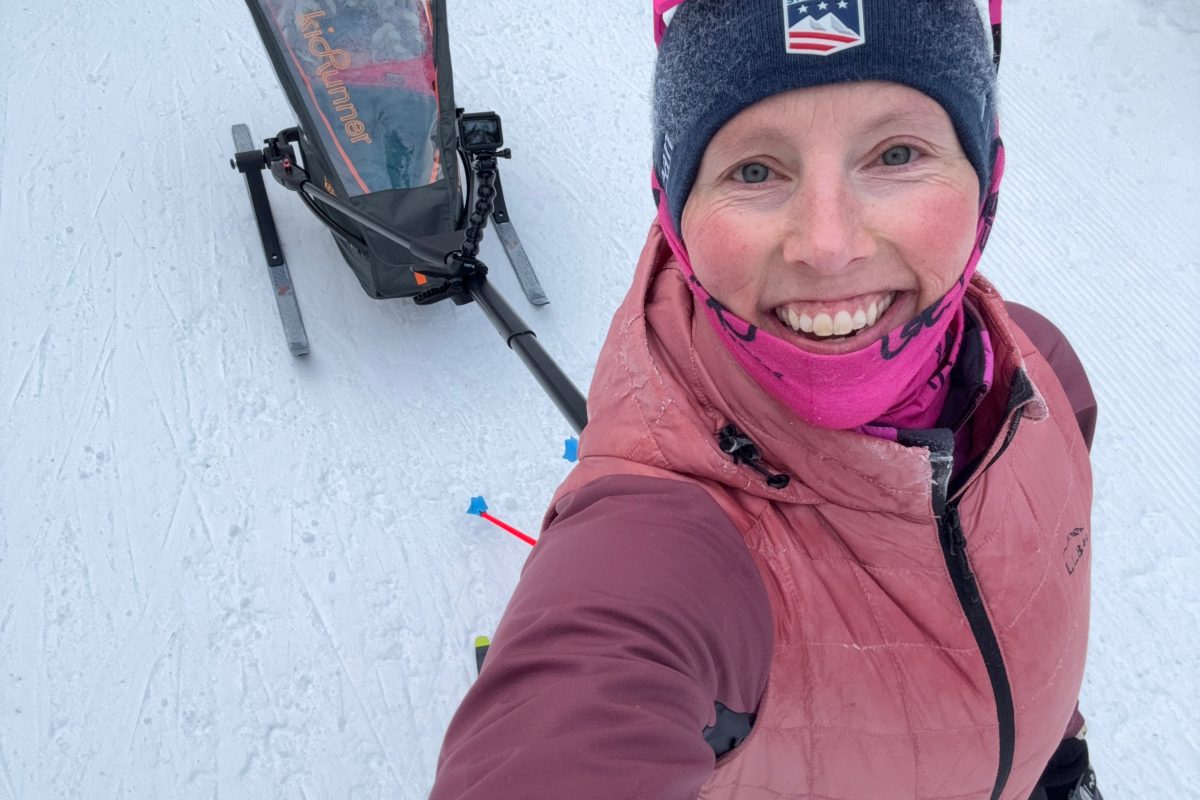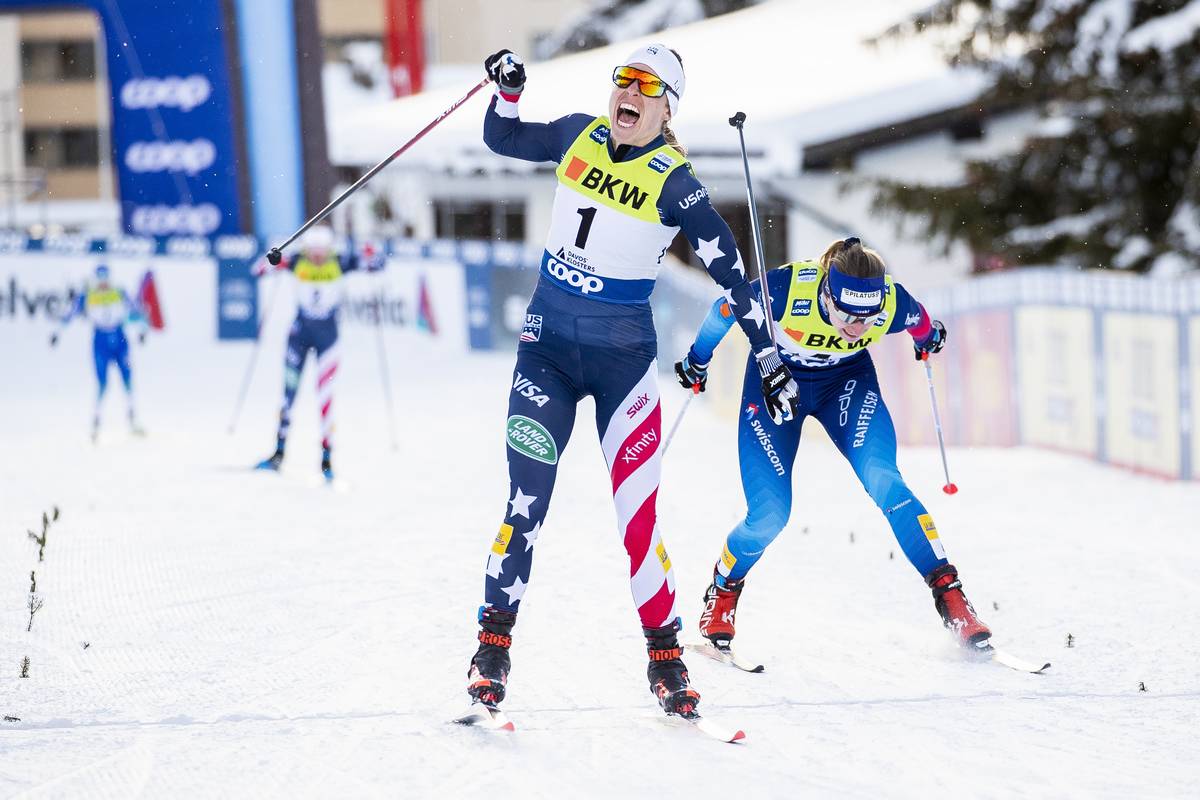
Last fall, one thing was certain — the pandemic would worsen. And it did. Rosie Brennan, summed up her feelings about traveling to Finland for the first round of World Cups by jumping in head first, masked, of course.
“I don’t believe anyone knows the answer [to if we should or should not have a World Cup] as we are all experiencing this pandemic for the first time and still don’t have a full grasp of what is safe and what isn’t,” Brennan wrote in early December. “At this point, I made the big journey to get over here so I am going to stay and continue to race as long as it feels safe enough. There is obviously no such thing as zero risk so it’s all a balancing act and weighing the risks versus rewards daily.”
Brenna’s big journey paid off. She finished that first weekend in Ruka, a three-race series, fifth overall. Norway’s Therese Johaug won, followed by Tatiana Sorina of Russia, and Sweden’s Ebba Andersson and Frida Karlsson, respectively. Outside of Jessie Diggins, Brennan’s U.S. teammate, no other North Americans placed in the top-30. (Canada, due to Covid related issues, would not arrive on the scene until much later in the season.)
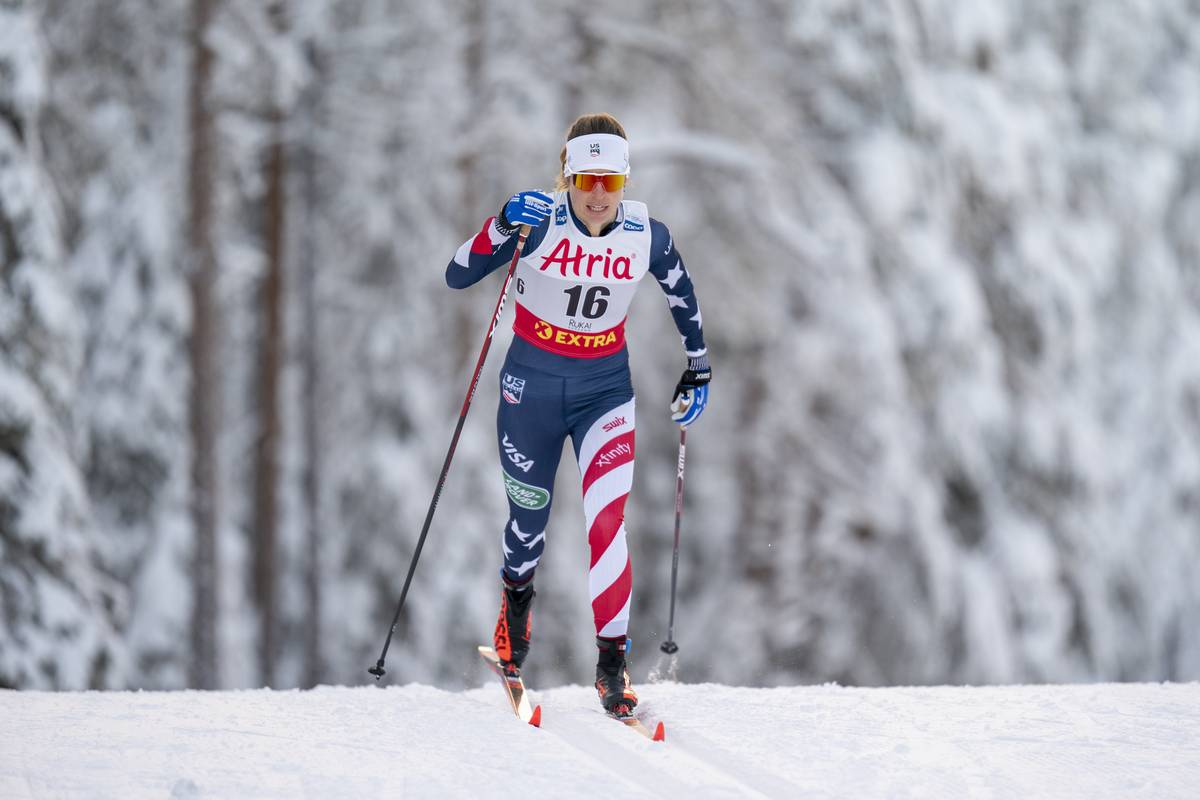

At 32-years-old, fifth place was then a career-best result. That high water mark would soon fall. Shattered might be a better way to describe it.
For a time, the World Cup seemed like it was teetering on collapse. Shortly after Ruka, Norway, Finland, and Sweden pulled from World Cup competition. Sweden and Finland returned for the Tour de Ski. If you have followed the sport closely, grit is an adjective to describe both Diggins and Brennan. Diggins’ grit shines on race day. She’s never to be counted out. Brennan’s grit, on the other hand, is the kind we tell our kids to possess when life doesn’t quite go their way. On and off, and on again, it was for Brennan and her U.S. Ski Team status. She hung in there. That’s been a boon for Brennan and the national team.
Brennan cashed in her chips in Davos, Switzerland. She won back-to-back races, a skate sprint, and the storied 10 k interval start skate. According to the data-crunching over at @StatSkier, Brennan was the oldest first-time winner of a sprint since the 2009-2010 season.
Brennan became the third American woman along with Sadie Bjornsen and Diggins to wear the yellow bib as the World Cup’s overall leader. She earned five podiums during the season. After five stages of eight during the Tour de Ski, she was second overall behind eventual winner Diggins. With performance bumps in stage six and seven, Brennan placed sixth overall.
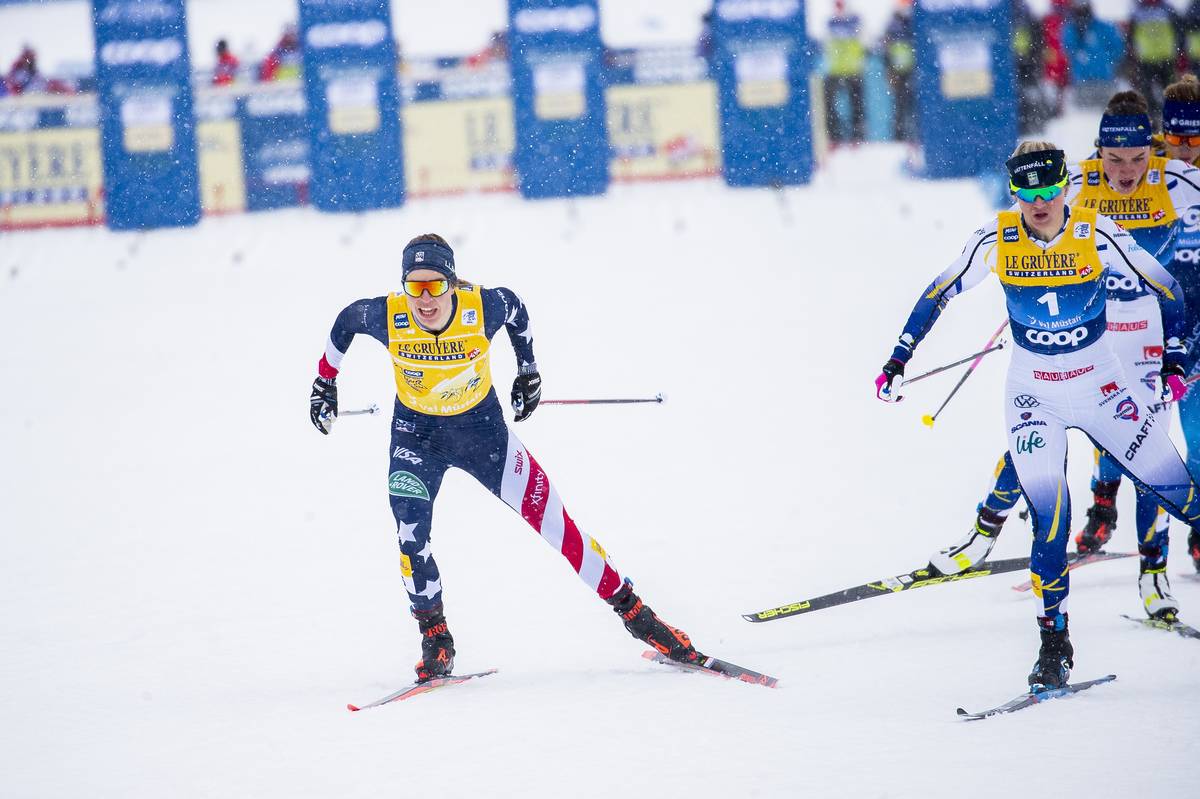
With her electric start to Period I and Period II, Brennan was in the conversation among the World’s best. By her own admission, the voltage eventually waned. She missed out on some goals later in the season. No matter, it was a breakthrough. She finished fourth in the overall standings, fourth in distance, and ninth in the sprint standings.
The capstone is that Brennan is relatively late in her career. The grit, which has sustained her for more than a decade, paid off with a signature 2021-2022 season. The interview with Brenna that follows has been lightly edited for clarity. We spoke with Brennan on April 23.
***
FasterSkier: You’ve had some time to reflect on your season. There was a lot to it. Some wins, a yellow bib, and traveling amidst a pandemic. Now that it is in the rearview mirror, what resonates the most?
Rosie Brennan: Honestly, I think just kind of making it through the season. Most of the summer and fall I didn’t know anything about what their schedule might look like. I mean no one did. And so I am definitely proud of myself for making the most of that. And I guess dealing with the adversity we all dealt with as best as I could.
I think that’s something that I will always remember, and hopefully, it will serve me well in my next life. Of course, those were my first podiums on the World Cup. You know it’s not something I ever take for granted…ever. That’s been the goal for a while. So it felt like one of those life goals that are out there that you’re never really sure if you’re going to get or not. So to get that kind of feeling, and to achieve some of the other goals that I set for myself, that was big for me.
FS: Our ears in the ground in Alaska tells us you had a speedy running time trial on Anchorage’s gas line TT course. I think you broke the record. And we are talking about a long legacy of very fit people who have time trialed that run. I’m guessing when you broke the record, you have a good idea that you were coming into some historic fitness for yourself.
RB: Gosh, that must have been in July of last summer. I definitely felt good. We do that time trial multiple times a summer, so I’ve done it at least once, if not twice a summer, for quite some time now, and I’ve been somewhere between one and five seconds off the record for the past two or three years now. So yeah it’s been a big goal, I’ll just put it that way.
And every time I had done it the past couple of years, I would just be a few seconds off the record. So I knew I was working with seconds, I just needed to figure out how to make up a second or two out there, Like it’s only a 10 and a half minute race so that shouldn’t be that hard to come up with a second. And when I broke the record, I actually broke it by quite a bit. That felt good, just thinking about my ability to break the record. But I didn’t think that I could break it by as much as I did. So after that, I knew that I was in the best shape I had ever been in.
Then we had some other rollerski time trials and other kinds of events that aligned with that. So it wasn’t just really good running shape, it was just good shape in general. So I did have a good sense of my fitness throughout the summer.
I would say, you know, that’s, to me that’s one of the things about Flora, is that he has always believed that I’ve been capable of that. So I wouldn’t say it was anything new, I continued to believe for sure and the excitement definitely but yeah I would say that he has made me believe that I was capable of a World Cup podium for quite a few years now so we were just chipping away at that and it took some time but we got there.

FasterSkier: Last season was unique, as we mentioned, for everyone. In particular, the APU training group normally is on snow at least once a month at the Eagle Glacier. Due to the pandemic, restrictions on travel, and group size, you were unable to get on snow until I think late fall on some of the higher elevation snow around Anchorage. You had a great season from a stats point of view. Does last summer’s training, and the lack of on snow time, make you think more about how to modify your training coming into this new training cycle?
RB: I would not say not being on snow was helpful, but I would say COVID was extremely helpful for me in some ways. I am somebody that works really well off of consistency, and I’m really lucky that we have such a strong group in Alaska, so I wasn’t missing people pushing me or having different challenges, or people to learn from. I had that every day still, but not traveling and not adding additional stresses into my schedule was hugely beneficial. I think I just simply had the most consistent trading I’ve ever had in my life — it was just everyday training twice a day, day in day out for forever.
There were no distractions, no, no nothing. And that might be hard for some people but for me, particularly, I think as an older athlete that’s pretty attuned to training like that it was really enjoyable. Honestly, it worked really well for me. I’ve always had a feeling that would be the case for me but I’ve never gone so extreme, and I don’t know that I want to go that extreme this year. It is nice to see some different places, see some other teammates and family and stuff every once in a while, but I’m hoping to minimize my travel, and just have a consistent training schedule with my team in Alaska.
FasterSkier: Let’s circle back to reflecting on the race season. You arrived in shape. Two wins in Period 1. A fantastic Tour de Ski. But the energy, as the season progressed, waned a bit if we are speaking strictly of results. How would you describe this season?
RB: I would definitely call it a breakthrough season for myself as a whole. Any season, and fortunately this one was long enough that there were high points and low points, and goals exceeded as well as goals not met. Period I was a huge high point for me. And, you know, I think I’m far enough away from the Tour de Ski to call it a microcosm of the season.
It was a really big learning experience for me. Some real positives came out of it and also some tough days. I was really happy with how I handled the racing after the Tour. I think I had a good plan working through all that, but World Champs was a big disappointment for me. And I’m not sure I have all the answers to why I guess that’s just sport. I have some ideas, some takeaways, to try and adjust for next year.
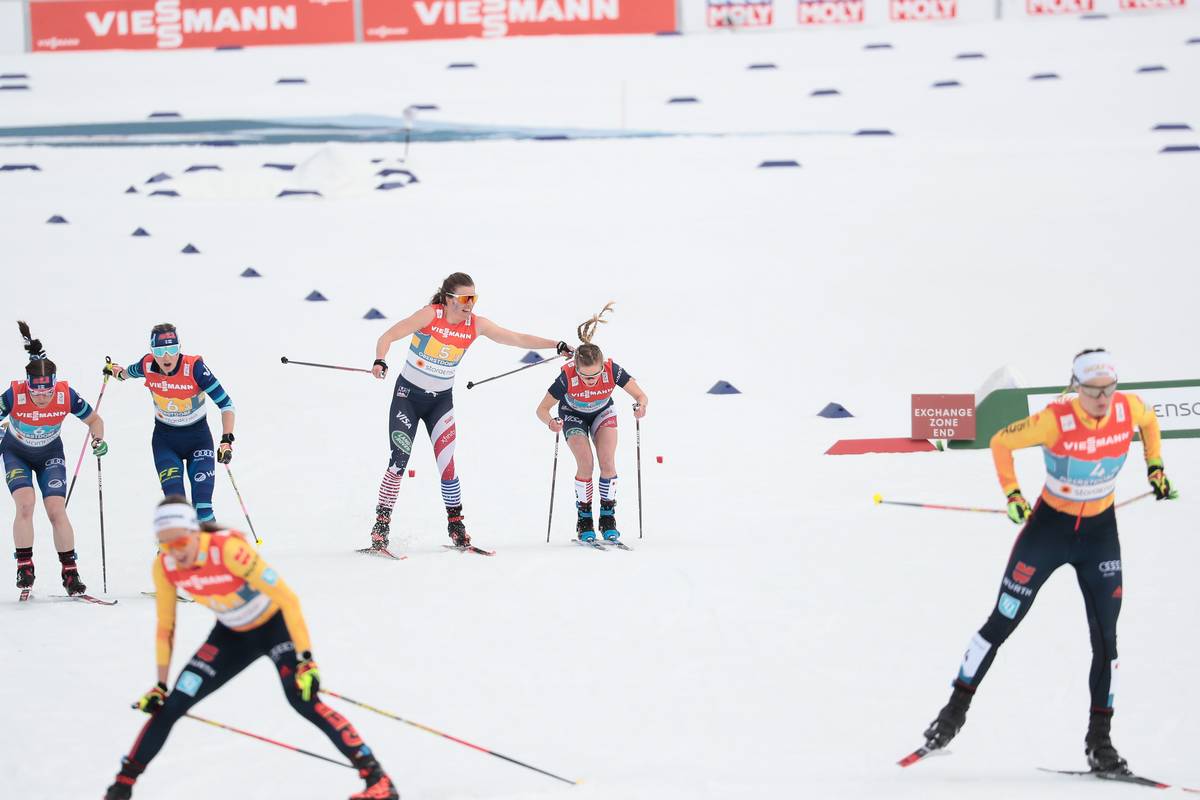
FasterSkier: All things considered with travel, you did have a dense race schedule. You race most of the World Cups. You skipped the sprint weekend in Dresden, as well as the sprint weekend in Ulricehamn. With next season an Olympic year, do you look at your intense race schedule and think maybe in the run-up to the Olympics, you might try something different, like not doing the Tour, or racing more selectively when it comes to distance races too?
RB: It’s funny, because yeah, I did race more or less everything. But we did have a few race cancellations in there so it still felt like less racing than I’ve done in past years. So I felt relatively comfortable with the amount I raced. I think that’s kind of, I guess what I found to be the sustainable amount, right around what I did this year. But, you know, the interesting part was World Champs are always later than the Olympics. So, it’s always more of a little bit of a puzzle to figure out how the Tour fits into that racing. It was just really hard to travel, so the risk of coming home and going back over was exponentially higher than it is in other years. In a normal year, it’s worth the risk of travel to go home for me. I like that kind of mental break from the road. But this year was just a little much. You just never knew if a race was going to get canceled the next weekend, so I felt like I just had to keep throwing my hat in the ring until the season was over.
Just because we didn’t know what was coming. That also makes it hard to plan for the Olympics just solely based on this year because there were just enough unknowns that the plan was always a bit of a moving target. But I’ve done enough championships now at this point in my career that I have more data points than just this year to go off of. So, I will be looking at, you know, kind of all the championship years to figure out what schedule will work best for me. But one of my goals is to come into the Olympics with a little more energy. Maybe, I don’t know, we’d call it an excitement that I had out here definitely kind of hitting the low energy stores at that point.
FS: Would you consider skipping the Tour de Ski next year? It is not uncommon for some top World Cup skiers to pass on that race series in a World Champs or Olympic year.
RB: Yeah, for sure. Yeah, I did that in 2019 before Seefeld. I raced Period I, and then I skipped the Tour. I felt that was a positive thing for me, I think it gave me a little more energy and motivation heading into those Championships. The hard part is I love doing the Tour. It’s a really fun event. So it’s always kind of a battle of what my personal goals are. But obviously, the Olympics are a big one so that’s something I’m considering and, you know the other thing is that the Olympic venue is almost the same altitude as Soldier Hollow and so the fact that Park City is, is another place I call home, makes it so the benefit of training here is that much greater. So I definitely would like to try to incorporate a trip back home to Park City at some point, to do an altitude camp and prepare for the Olympics. Both, during the summer and then also during the season.

Rosie Brennan (USA) – FIS world cup cross-country, tour de ski, final climb women, Val di Fiemme (ITA). www.nordicfocus.com. © Modica/NordicFocus. Every downloaded picture is fee-liable.
FasterSkier: How do you see your role on the U.S. Team now that some heavy hitters have retired? You have had a more than simple relationship with the national team with the main idea being that you’ve been on the team, off the team, on the team again, and now finding success on the World Cup. How important is it for you to be part of shepherding this younger crew along to fill some of the voids that have been created with recent retirements?
RB: That’s important to me. I don’t know how many years I have remaining in my career but that has been one of my biggest motivators to keep racing — just to make sure that we don’t lose momentum on our team, and that I’m leaving the young girls in a place where they’re ready to have success. To make sure it is a seamless transition. That’s been a huge motivator for me to keep going. I’m lucky that a lot of those girls and boys are on APU and so I’ve worked with them every day, and they challenge me as much as I challenge them and we learn a lot from each other. I do like that energy…I used to get embarrassed by my age, but I feel that I’ve grown and embraced it a bit, and I enjoy working with this group. It’s an incredible group. It’s fun to be a part of so it’s not a burden. I enjoy working with them and I hope that is helpful. I want to be a good leader, that’s a goal.
It’s hugely satisfying to know that you can be as good as you thought you could. And, you know, more than anything for me, it’s so satisfying because of all the ups and downs I’ve had, and the perseverance I found to stick it out. It gives me that much more satisfying to meet some of those goals. I have some unfinished business with the Olympics. So I’m hugely motivated for this coming season.
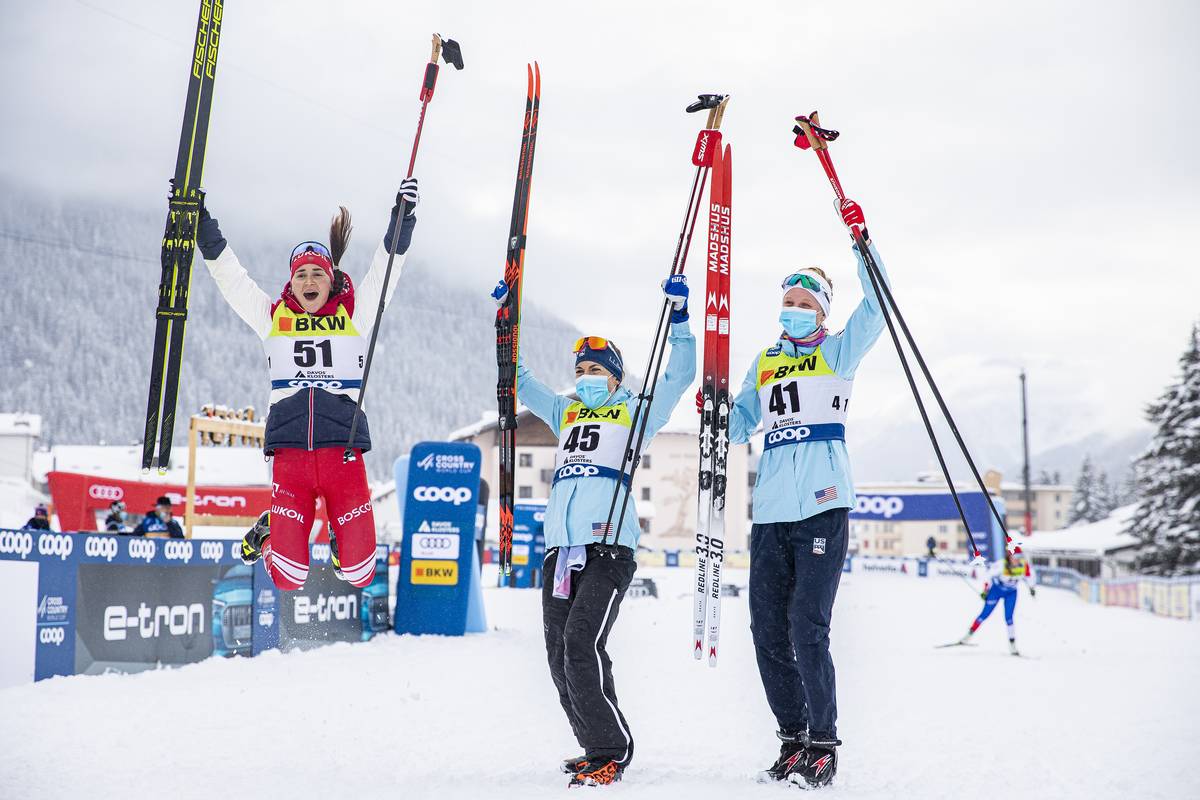
Jason Albert
Jason lives in Bend, Ore., and can often be seen chasing his two boys around town. He’s a self-proclaimed audio geek. That all started back in the early 1990s when he convinced a naive public radio editor he should report a story from Alaska’s, Ruth Gorge. Now, Jason’s common companion is his field-recording gear.


